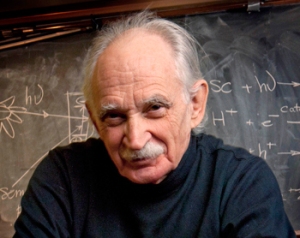Jan 15 2014
President Barack Obama has named College of Natural Sciences chemist Allen Bard a recipient of the Enrico Fermi Award, one of the government’s oldest and most prestigious awards for scientific achievement.
 Allen Bard, professor of chemistry and recipient of the Enrico Fermi Award. Photo: Marsha Miller.
Allen Bard, professor of chemistry and recipient of the Enrico Fermi Award. Photo: Marsha Miller.
He shares the honor with Andrew Sessler, director emeritus of the Lawrence Berkeley National Laboratory.
The presidential award carries an honorarium of $50,000, shared equally, and a gold medal. The award is administered on behalf of the White House by the U.S. Department of Energy.
“Allen Bard and Andrew Sessler have advanced the science and technology frontier throughout their distinguished careers and, in doing so, have contributed greatly to sustained U.S. leadership in research and development,” said Secretary of Energy Ernest Moniz. “I congratulate them for their achievements and hope that the example they set serves as inspiration to future generations of scientists and engineers.”
The Fermi Award honors the memory of Nobel laureate Enrico Fermi, the first scientist to achieve a nuclear chain reaction and a pioneer in the field of nuclear and particle physics. The award has been presented to outstanding scientists since 1956. It is given for distinguished achievement, leadership and service related to all basic and applied research, science and technology supported by the Department of Energy and its programs. Secretary Moniz will present the Fermi Award at a ceremony in Washington, D.C., on Monday, February 3, 2014, at 3 p.m. EST.
Bard was selected for his significant contributions to basic research, technological innovation, teaching and service. His exemplary career and dedication to the highest ideals of scientific research have served as a model for generations of scientists in the United States and abroad and earned him a reputation as the “father of modern electrochemistry.” Through his service to the profession, including numerous publications, training of scientists and applications of research to a broad array of challenges in the energy domain, he has raised the scientific standard in, and brought national and international recognition to, the field of electrochemistry.
Electrochemistry holds significant importance and promise in the field of energy research, underlying recent advances in batteries, fuel cells and solar photoelectrochemistry, and supporting a range of advances in biology, chemistry, physics and engineering.
Bard received a B.S. in chemistry from the City College of New York in 1955, an M.A. in chemistry from Harvard University in 1956 and a Ph.D. in chemistry from Harvard in 1958. He joined the faculty at The University of Texas at Austin in 1958, where he holds the Norman Hackerman-Welch Regents Chair in Chemistry and is director of the Center for Electrochemistry in the College of Natural Sciences. Bard has published more than 900 peer-reviewed research papers and 75 book chapters and other publications, and he has received more than 23 patents. He is the recipient of the Wolf Prize and a National Medal of Science, among numerous honors.
For more information, contact: Lee Clippard, College of Natural Sciences, 512-232-0675.